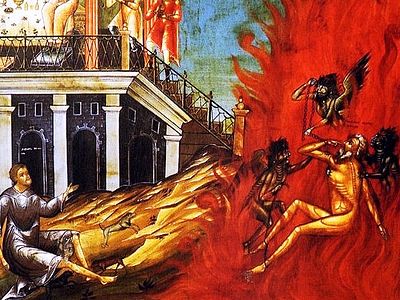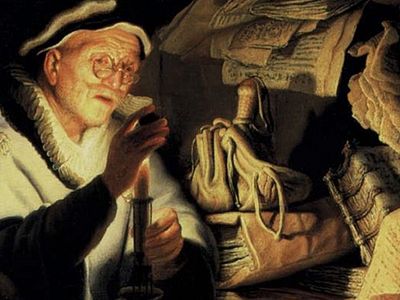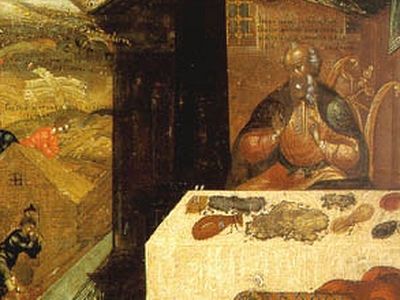The following homily was delivered by Fr. Peter Pier at St. John Chrysostom Antiochian Orthodox Church in York, PA on Sunday August 30, 2015.
* * *
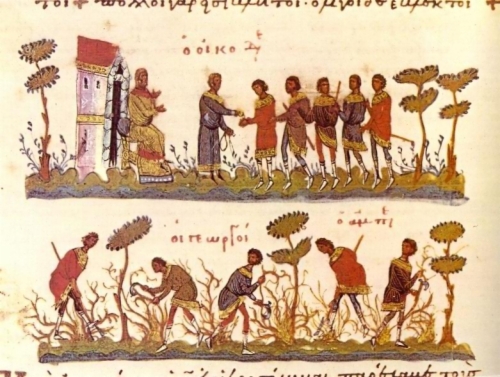
In the name of the Father and of the Son and of the Holy Spirit, one God. Amen.
In our Gospel reading this morning our Lord Jesus Christ once again tells us the parable of the vineyard, and in this parable there is a wealthy man who owns a plot of ground and who plants a vineyard on this plot of ground. He then digs a hole for a winepress and he also erects a tower to protect the vineyard from vandals. And then he leases out the vineyard to tenant farmers and of course the arrangement here is supposed to be that the tenant farmers will work the vineyard and then pay the landowner when the fruits come in.
But what happens is that the tenants begin to see themselves not as the tenants but they begin to see themselves as the owners of the vineyard. After all, they’re the ones living there and working the land and pressing the grapes and doing all the hard work—it belongs to them, and not to the landowner. So when the landowner sends to them his servants to collect the rent they beat some of them, they kill others, and throw others out of the vineyard, and then the landowner sends yet more servants and they do the same thing to them. And then the landowner sends his only son. And they do not respect the son but they say “This is the heir. This is the one who will inherit the vineyard. Let us kill him and the vineyard will be ours,” and so they kill him and throw him outside the vineyard.
And the Lord, having completed this parable, turns to those who were listening and says to them, “So tell, me what will the lord of the vineyard do to those tenants?” And the people who have been listening very rightly answer that he will put those miserable wretches to a wicked death and he will let out the vineyard to other tenants.
This parable is about the nation of Israel. God is the landowner and the vineyard is the land of Canaan—it is the nation-state of Israel, and the tenants are the people of Abraham who were given the promise of the land. And the arrangement was supposed to be that they would understand that the land is a gift from God and that their choosing by God to live in the land was a gift from God and that they would therefore render to God the proper obedience and praise that was His just due.
But what happened over time is that many people in the nation of Israel began to see themselves as the possessors of the land. The land belonged to them, not to God. And so they began to break His laws and commandments and they also began to fail to worship and to give the praise to God that was His just due. And so God sent to them His servants, the prophets, who were supposed to try to bring them back to their senses, if you will. But many of the prophets were beaten or stoned and cast out of the land of Israel just like the servants in the parable. And then, of course, finally God sent His only Son, but they didn’t respect the Son but rather they killed Him and hung Him on a tree. And so thirty seven years after our Lord spoke this parable, the last portion of the parable came true.
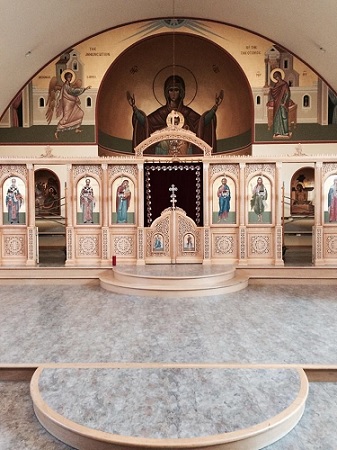 St. John Chrysostom Antiochian Orthodox Church, York, PA
St. John Chrysostom Antiochian Orthodox Church, York, PA
And if you think I’ve stretched this too far, let me remind you that when the bishop is here we sing the longer Trisagion hymn. And the bishop three times comes out of those holy doors and with his trichiri and dichiri, his two and three-branched candle stands, makes the sign of the Cross over you, and what does he say? “O, Lord, O, Lord, look down up on this vineyard which Thou hast planted, and establish it.” Three times. This is the new vineyard of the Lord. As I said it’s no longer a geographical country, but the mystical Body of Christ and where the Church is there is the vineyard of the Lord, and we are the new tenants.
And therefore, as I said a moment ago, what was applicable in the first covenant is applicable to us as well. In the first place, we need to realize that the church doesn’t belong to us. This is not our possession. I say that because over time people sometimes begin to think it’s their church. After all, it’s where they come to worship. They’re the ones that put money in the offering and keep the church running. “The church belongs to us.” This is what some people begin to think.
My friends we must never ever allow that to happen. This is never our possession. It is not ours. It is the Lord’s church. And just as the first people of Israel were to recognize that He was the landowner, so must we. And also just as the first people of Israel were to be obedient to His commandments and keep His laws, again, the same is true of you and me. And just as the first people of Israel were to render unto the Lord the proper praise and worship, still do we do in this place. So long as we do these things, so long as we realize that the vineyard is not ours but it is a gift given to us, so long as we realize that we are here to work out our salvation and that we are here to do the work of Christ and care for other people, the Lord will continue to bless this vineyard that he planted and he will establish it unto the ages.
You may not know this, but at the end of the Divine Liturgy, the Deacons pray the prayers after Holy Communion and one of the prayers is a prayer for this holy house that God will preserve this holy house unto the end of the age. Which means, until the Second Coming of Christ, St. John Chrysostom Orthodox Church will stand. It will stand my friends just as long as we are faithful and just as long as we understand Who the Master is and who is the servant, as long as we understand that this is a gift given to us for the working out of our salvation and the salvation of others. As long as we remember that, this vineyard will flourish.
In the name of the Father and of the Son and of the Holy Spirit. Amen.
